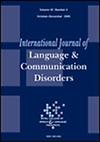Participation and Experiences in Extracurricular Activities for Children With Developmental Language Disorder and Their Peers
Abstract
Objectives
Participation in organised extracurricular social activities (OESAs) can provide wide-ranging positive developmental benefits for children. This study investigated whether participation and experiences differ for children aged 4- to 12-years with a developmental language disorder (DLD) compared to their typical language developing (TLD) peers.
Methods
Parents of children with DLD (n = 18) and those of TLD peers (n = 21) reflected on their child's participation and experiences in OESAs.
Results
Results demonstrated that parents of children with DLD reported engagement in a similar number of OESAs and for a similar length of time on a weekly basis compared to parents of TLD children. Additionally, when evaluating factors that facilitated positive participation experiences— such as their child's abilities and behaviour, features of the OESA, and the social environment —parents of children with DLD provided ratings mostly comparable to those of TLD parents. However, when children disengaged from an OESA, ability-related factors, such as communication, motor, and social skills, were more likely to be reported to influence the participation experience for children with DLD.
Conclusions
These findings underscore the importance of fostering accessible and positive OESA experiences to support meaningful participation and access to the developmental benefits of OESAs for children with DLD.
WHAT THIS PAPER ADDS
- Children with developmental disabilities often experience reduced participation in organised extracurricular social activities (OESAs), limiting their access to important developmental opportunities. For children with developmental language disorder (DLD), research has focused primarily on academic challenges, with limited understanding of their participation and experiences in non-academic, socially orientated activities. Previous studies have generally assumed participation barriers dominate the experiences of children with disabilities, potentially overlooking strengths, facilitators, and positive developmental contexts like OESAs.
- This study provides the first comprehensive comparison of OESA participation and experiences between children with DLD and their typically developing peers. Findings suggest that children with DLD participate at similar rates, intensities, and breadths and generally have positive experiences. Ability-related factors such as communication and motor skills influenced disengagement but did not preclude participation. By applying a biopsychosocial framework, this study moves beyond a deficit-based view and highlights the potential for inclusive OESA environments to support social development for children with DLD.
- OESAs offer developmentally rich contexts that may support social engagement and psychosocial well-being for children with DLD. Clinicians and educators should encourage participation in OESAs while being mindful of subtle ability-related challenges that may affect sustained engagement. Targeted support strategies—such as facilitating beginner-friendly entry points and fostering inclusive peer environments — could optimise participation. These findings highlight the importance of advocating for accessible, socially supportive community programmes as part of holistic developmental support plans for children with DLD.


 求助内容:
求助内容: 应助结果提醒方式:
应助结果提醒方式:


